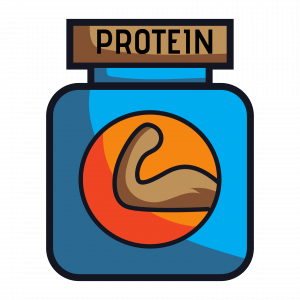
THE POWER OF PROTEIN
- The most important macro nutrient is body require is protein. Protein is essential and important component in every cell of our body.
- Proteins are made of amino acids. Protein is building block of Skin, Cartilage, Bones, Muscles and Blood.
- Our body use protein in building muscle and repairing tissues.
- After workout protein help in repairing and rebuilding the muscle fibers that has broken during workout and eventually that leads to muscle gain. Protein also make enzymes, hormones and other chemicals.

BENEFITS OF PROTEIN
Improved Muscular system
Protein is building block of our muscles. Eating adequate protein is important to maintain healthy muscle mass and there were studies which shows that eating adequate protein will increase muscle mass and strength.
Balanced Hormones
A study stated that eating adequate protein decreases the level of “hunger hormone” ghrelin and stimulates the production of hormones that makes you feel full.
A study stated that people who eats sufficient protein experienced an increase in fat burning and metabolism. Both factors plays important role in hormone balancing.
Improves Hair and Skin
Protein deficiency can result in hair loss. Protein is very important for our hair growth. Having high amount of protein regularly can prevent hair loss and promote hair growth.
Collagen protein is structural tissue in our body which provides elasticity to the skin. Consuming enough collagen will keep our skin firm and healthy.
Regenerate Cells and Tissues
Our body constantly building new cells to replace old ones and amino acids in protein supports this process.
Performing resistance training to the point of fatigue cause the damage to the proteins that comprise muscle fibers. The role of protein is to help repair tissues damaged by exercise.
Improves your Nervous System
Neurotransmitters in brain, which regulates our moods are made from amino acids. Most of these amino acids come from protein that we consume.
There are several other benefits of protein.
How Important Fast and Slow Absorbing Protein are ?
Fast Absorbed Protein
- These are the proteins we all know the most about, they’re rapidly absorbed by the body and reach your muscles in record time (within 30 minutes usually).
- These proteins are easy to digest and breakdown.
- Best taken when a rush of amino acids is needed to immediately ‘jump-start’ muscle repair.
- Most common fast release protein out there is Whey Protein.
Slow Absorbed Protein
- Slow absorbed proteins are those which body takes time to digest and absorb ex. Casein, milk, Paneer, Chicken etc.
- Gives a slow, sustained release of an amino acids.
- Ideal time for this type of proteins is when you need sustained release of protein to prevent muscle breakdown for longer period.
First Class proteins vs Second class protein (Complete Protein) (Incomplete Protein)
- The reason to eating protein is to supply all amino acids for muscle repair.
- Each First-class protein contains all 20 amino acids.
- Sources- 1. Eggs 2. chicken 3. Cottage Cheese (Paneer) 4. Seafood 5. Shrimp 6. Protein Supplements (Whey Protein)
- Second Class protein lacks in one or More Amino Acid therefore are not preferable.
- You will find second class protein in – Most Vegetables, SOYABEAN.
DIFFERENT TYPES OF WHEY PROTEIN

Protein and fitness somehow go hand in hand and it is true. Protein can help recover muscles after a good workout session. But what type of protein is best? How to choose right supplement for yourself?
Read on to learn about various types of protein and how to choose protein according to your needs.
WHEY PROTEIN
Whey protein is by product in production of cheese. Once thought as a waste, whey protein is now one of the most popular protein.
Whey protein is simple an extraction from milk.
Muscle building amino acids such as leucine, Isoleucine, Valine are high in whey protein.
Whey is one of the fast digesting protein source.
BENEFITS OF WHEY
Anabolism
Boost Immune system
Anti-oxidant
Muscle growth
Good sources of bcaa’s
There different type of whey available in market according to your goals which type of protein is best. Read on to learn about various types of proteins.
WHEY PROTEIN CONCENTRATE
Whey protein concentrate is more cost effective or affordable. Required less purification time but contains more fat and lactose that other protein out there.
WHEY PROTEIN ISOLATE
Whey protein isolate is expensive version of whey as it contains more protein than concentrate around 90%. Isolate is low in fat and lactose so is ideal supplement for lactose intolerant people.
It is chemically purified so remove everything other than actual protein source.
CASEIN PROTEIN
Casein is anti-catabolic protein. Casein is also know as “time release” or “slow release protein”.
Casein is digested slowly while whey digested rapidly this is the main difference between both.
Milk has two types of protein casein 80% of milk protein and whey 20% of milk protein.
Like any other animal protein casein also provide every amino acids needed for Recovery and growth. People take it before bed it can prevent your muscle loss because it’s slow releasing ability will nourish your muscles for long time while you sleep.
There are two types in casein:
Micellar Casein: Digested slowly and most popular
Casein Hydrolysate: Predigested and digested rapidly
WHEY PROTEIN HYDROLYZED
Hydrolyzed protein is fast absorbing protein than concentrate or isolate.
When you hydrolyze protein you broke larger fragments down into smaller fragments which is quickly absorbed.
It is pre-digested hence will typically release amino acids at faster rate. Hydrolyzing protein will increase bio-availability of protein and also increase muscle protein synthesis.
EGG PROTEIN
Egg protein is one of the highest quality protein. It is produced by drying process which simply converts liquid egg into powder form. It is great choice for those who are allergic to whey or casein.
The information on this article has not been evaluated by the Food & Drug Administration or any other medical body. We do not aim to diagnose, treat, cure or prevent any illness or disease. Information is shared for educational purposes only. You must consult your Dietitian or Nutritionist before acting on any content on this website, especially if you are pregnant, nursing, taking medication, or have a medical condition.